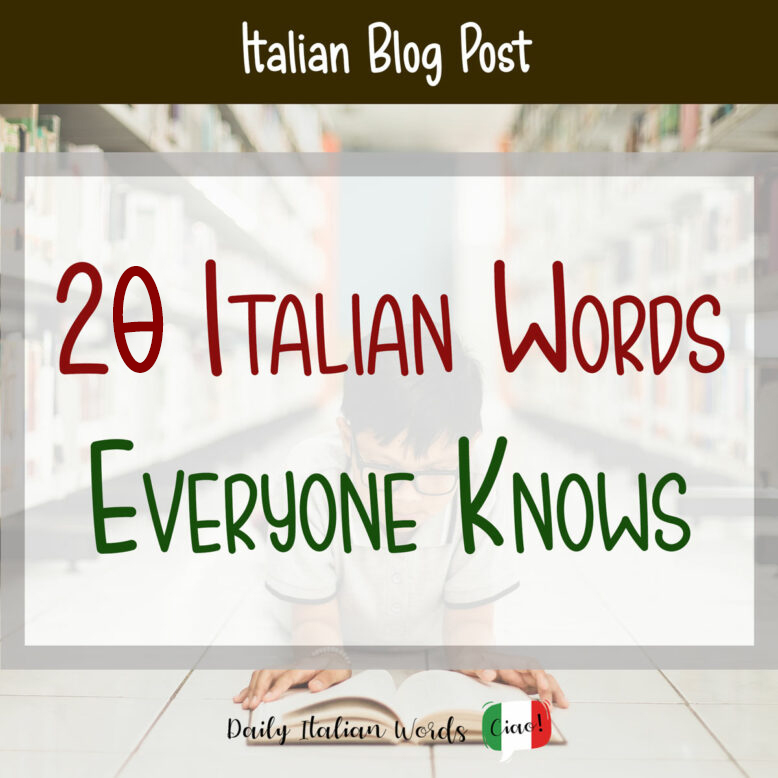I’m willing to place a bet right now. I bet that every single person you know already knows 90% of the words on this list. They might not know the word is Italian, and they might not know the true definition of this Italian word – but they already know it. And likely have used it once themselves in a sentence.
The Italian language is a part of the English language. There are many Italian words that we use in English and don’t even bother translating, like food or music terminology. There are some Italian words that English-speakers just love and have adopted into our everyday vernacular. Challenge yourself and your non-Italian speaking friends: how many of these words do you already know?

1. Ciao – Hi
This salutation has been adopted into the English language – it’s even in the Merriam-Webster dictionary! But it is important to note that this word is in fact Italian. It is most often translated as meaning “hi”, but is also equally commonly used as a word of parting (i.e. “Talk to you later, ciao ciao!”)
2. Capiche? – Do you understand?
Technically, this is not an Italian word. Capisci and capisce are Italian. This American slang term is a mispronounced, misspelled variant based on an Italian word. The meaning, however, remains the same. Do you catch my drift?
4. Grazie – Thank you
While most of us don’t quite pronounce this word correctly – most of us would recognise the meaning of the word grazie instantly. Gratitude.
5-12. Gelato, Pasta, Spaghetti, Penne, Linguine, Ravioli, Pizza, Lasagne
Numbers 5 through 12 on this list are all food words. These are all words that we don’t bother translating into English. English linguine is the same as Italian linguine. If you haven’t tasted all of these popular Italian foods yet, head to your local grocery store’s Italian aisle (or the freezer ice cream aisle for the gelato) and experiment with a new Italian dish at home!
13. Al dente – Pasta cooked to perfection
Directly translated, this phrase means “to the teeth”; in layman’s terms, this means pasta cooked to the right degree so that when you take a bite, the pasta isn’t too hard or too soft. It’s got a perfect bite on the teeth.
14. Bravo! – Well done!
At the end of a fantastic concert, you will likely see a standing ovation, and possibly also a big fan calling “Bravo!” to the performer. In English, we acknowledge this word to meaning “a stunning performance”, while in Italian this word can be used more generally as “good” or “well created”.
15. Prima donna – Leading lady in an opera
This phrase is used to describe the female star in an opera company. In English, it sometimes implies a woman that is very full of herself and demanding to be treated with stature. As a fellow soprano, I can attest that we do get a “diva” attitude when we are the Prima Donna.
16. Maestro – Concert conductor
This word has taken on a meaning of its own in English. To an Italian, this word simply means “teacher”, like Mrs. Anderson that taught you in 2nd grade. To an English-speaker, a maestro is a musical director.
17. Finale – End
The Grand Finale of a concert or a fireworks display is sure to get a round of applause.
18. Tempo – Speed of music
In the music world, we use this word to describe the speed of the music. In its original Italian, however, it simply means “time” or “duration”, or can even be used to describe the weather.
19. Forte – Strong, loud
The word forte, in music terminology, means to play loudly and with strength. It can also be used in other contexts to describe someone’s strengths (activities they are good at).
20. Piano – Soft, quiet
The definition remains the same in English and in Italian – soft and quiet. However, in Italian, this word can also be used for a projected plan or to describe the levels of a building.
In both languages, it is also possible to use this word to describe an instrument with strings and keys. But in Italian, it is commonly referred to as a pianoforte.

Written by our American contributor in Florence, Lyssa Yapp.
Heather Broster is a graduate with honours in linguistics from the University of Western Ontario. She is an aspiring polyglot, proficient in English and Italian, as well as Japanese, Welsh, and French to varying degrees of fluency. Originally from Toronto, Heather has resided in various countries, notably Italy for a period of six years. Her primary focus lies in the fields of language acquisition, education, and bilingual instruction.


